Why does my dog smell like fish? If you are pondering (or perhaps googling) this question, then you have come to the right place! Integrative veterinarian Dr. Julie Buzby helps you get to the bottom of your dog’s fishy odor and gives you some solutions that aren’t fishy—and can help your dog smell less fishy too.
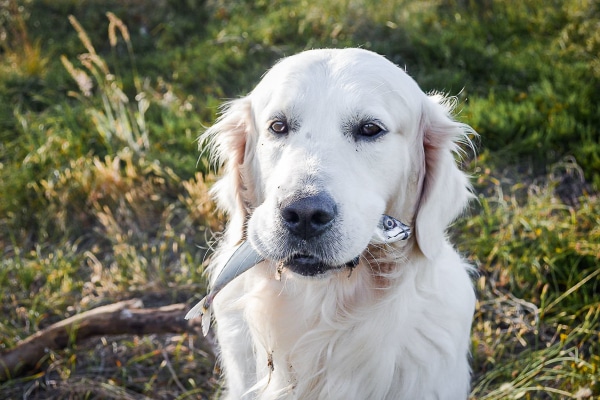
Depending on your dog’s sense of adventure and level of hygiene, he or she can exhibit any number of odd odors that may lead you to sniff and exclaim, “What did you get INTO?” But one particular scent can be an indication that your dog may need a visit to the veterinarian.
Specifically, I’m talking about your dog smelling like fish. If your dog didn’t just roll in a dead fish (that you know of…) then he or she might have one of these four issues we are about to talk about. So let’s dive right in!
Fishy odor #1: Dental disease
Perhaps you’re wondering “Why does my dog’s breath smell like fish?” Assuming that your dog doesn’t normally eat fish or a fish-based kibble, fishy breath could be a sign of dental disease in dogs (i.e. periodontal disease).
It is estimated that 80% of dogs have some degree of periodontal disease by the age of two years. So there is a decent chance this is the culprit for your dog’s bad breath. Wondering why this is the case?
The reasons for periodontal disease in dogs
Well, first of all, dental health in animals is very strongly genetically linked. If your dog is one of those breeds predisposed to dental disease, or had parents with “bad teeth,” he or she probably has bad teeth too. This means your dog will most likely often have smelly breath. And he or she will require dental cleanings more often than other dogs.
Secondly, even the best trained dog can’t be responsible for his or her own oral health. If you don’t regularly brush your dog’s teeth, oral bacteria can go to town in your dog’s mouth. The end result is inflamed gums, your dog losing teeth, a painful mouth, and fishy breath.
Unfortunately, even if you never miss a day of brushing your dog’s teeth, sometimes it still may not be enough to completely combat the bacteria in your dog’s mouth. Those “bad teeth genetics” can’t just be brushed away. (But don’t get me wrong—brushing is still a very good thing).
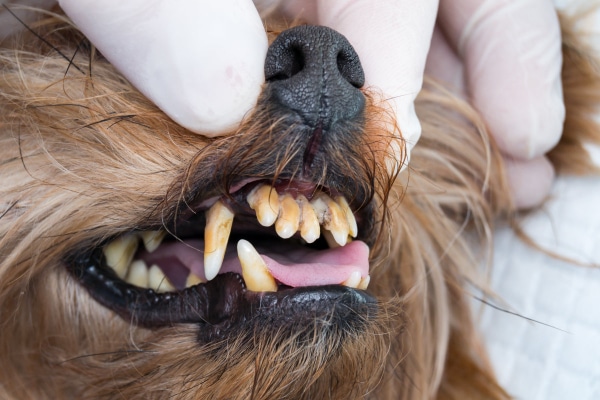
So what can you do about your dog’s fishy breath?
A veterinary dental cleaning can give your dog fresh breath
Nothing can replace the effectiveness of a veterinary dental cleaning. By the time your dog has bad breath and severe periodontal disease, this is the best—and really the only—solution.
Let me hop up on my soapbox for a moment. I want to stress the word “veterinary” when it comes to dental cleaning. An “anesthesia-free dental” simply won’t cut it. In order to deal with your dog’s dental problems, most of which are hidden under the gumline, your dog needs to go under general anesthesia.
I know it can be scary to think about anesthesia. You might be wondering, “Is my dog too old for anesthesia?” But it really is the safest and most effective approach. Anesthesia allows your vet to take dental X-rays to evaluate the jaws and tooth roots, scale the teeth to remove tartar, polish them, and extract any diseased teeth. Without anesthesia, a dental cleaning is primarily limited to scraping the tartar off the visible surfaces of the teeth.
(To learn more, read the American Animal Hospital Association (AAHA) guidelines on nonanesthetic dentistry.)
At-home oral hygiene tips for dogs
After your dog’s veterinary dental cleaning, his or her mouth will be fresh and pain-free. From there, you can (and should) take steps to maintain your dog’s good oral health. This can help prolong the interval between veterinary dental cleanings. And as an added bonus, your dog’s slobbery kisses won’t remind you nearly as much of fish!
Some at-home dental care ideas include:
- Brush your dog’s teeth with a canine enzymatic toothpaste at least three times per week. You should not use human toothpaste on dogs.
- Offer your dog dental treats or chews. Your veterinarian’s office should have specific options that they recommend.
- Consider water additives that help prevent the buildup of plaque.
- Feed your dog a specifically formulated dental diet like Hill’s Prescription Diet t/d Dental Care, Purina Pro Plan Veterinary Diets DH Dental Health, or Royal Canin Dental Care. These diets are designed to “scrape” buildup off the teeth as your dog chews. (Please note that regular dry dog food does not scrape the tartar off teeth effectively.)
- Ask your veterinarian at each wellness visit if they recommend a dental cleaning this year. It is best not to wait until your dog’s mouth is stinky and obviously diseased.
- Choose safe chew toys for your dog to prevent fractured teeth.
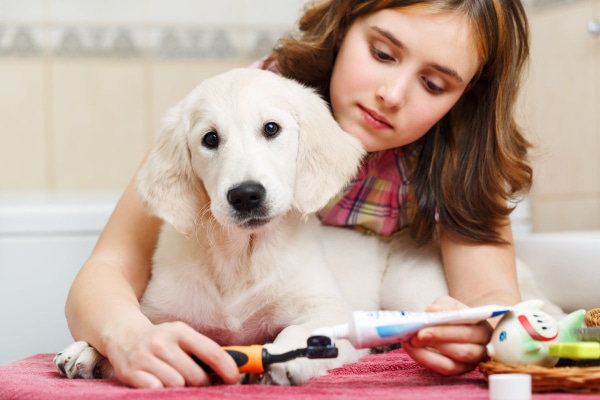
Fishy odor #2: Anal gland disease
Now let’s head to the other end of the dog. If you are wondering “Why does my dog’s butt smell like fish?”, anal sac disease is usually the most likely culprit. You see, every dog (and cat) has special glands that line the inside of the two anal sacs—one on each side of your dog’s anus. These anal glands produce an oily material unique to that particular dog, which is stored in the anal sac. When your dog sniffs another dog’s bottom, that’s the odor that they are sniffing for!
Ideally, every time a dog poops, a tiny amount of this foul-smelling material is squeezed out of the anal sac onto the stool. This marks your dog’s poop as “his” or “hers” so that other dogs know who was there for territory identification. Occasionally, your pooch can also express the material when startled, scared, or extra relaxed. This is totally normal. However, it is pretty stinky if it happens frequently!
Before we go further, let me pause to clear up some terminology that can get confusing. As I just explained, a dog technically has anal glands and anal sacs. But most people just call the combination of both the dog’s “anal glands.” So for the purposes of this article, that is the term I will primarily use too.
The trouble with anal glands
When all is working according to plan, the anal glands are a great scent marker for communication. However, sometimes the “exit” hole to your dog’s anal glands can become closed off. This can happen for many reasons—allergies, stress, trauma, or even stool that is the wrong consistency. Even though the opening is closed, the gland continues to make the material. But there is nowhere for it to go, so the sac becomes swollen. Eventually, the anal glands can become impacted or abscessed.
If your dog has full anal glands, you will probably notice him or her scooting or dragging the rear end on the ground. (And inevitably it seems to happen in front of company or on that nice rug you just had steam cleaned.) The dragging or scooting is your dog’s way of trying to release the pressure from the anal glands.
If you spot your dog scooting, make an appointment at the veterinary clinic. There, the veterinarian can examine your dog to see if the anal glands need to be manually expressed. If the glands are just very full, this is typically a mildly uncomfortable procedure at most for the average dog.
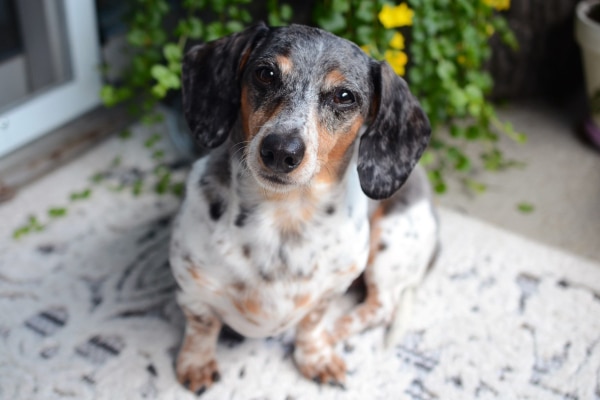
However, if the glands are abscessed or impacted, this is a different story. Your dog may need sedation or anesthesia to clean out the glands. Plus, he or she may go home with pain medication and antibiotics to promote comfort and proper healing.
In cases of repeat anal gland issues, your veterinarian may eventually recommend an anal sacculectomy. This is a last-resort procedure where the veterinarian surgically removes the anal glands.
How to prevent anal gland problems in dogs
Luckily, there are a few things pet parents can do at home to hopefully prevent their dog from needing anal gland surgery or suffering from an impacted or abscessed anal gland.
- Work with your vet to manage allergies, stool consistency issues, or other factors that are making it difficult for your dog to express the anal glands. Also, ask your vet to show you how to feel the glands at home to determine if they are getting too full.
- Ask your groomer not to express your dog’s glands. Overexpressing the anal sacs can cause inflammation, scar tissue, and eventually the loss of your dog’s ability to express them normally.
- Increase the bulk of your dog’s stool. Firmer stool is more efficient at expressing the glands normally. A few tablespoons of canned pumpkin for dogs with each meal is a great way to add dietary fiber without extra calories. Plus, dogs love the flavor!
- Consider using one of the over-the-counter supplements available for dogs with repeated anal gland issues.
Fishy fragrance #3: Urinary tract infections
While anal gland problems are pretty common, they aren’t the only reason for a fishy aroma around a dog’s rear end. Perhaps instead you are asking yourself “Why does my dog’s pee smell like fish?” or “Why does my female dog smell like fish?”
Sometimes highly concentrated urine can be a bit strong smelling. But it does not usually spell a problem for your dog. On the other hand, urine that smells like fish can also point to a urinary tract infection (i.e. UTI in dogs) or a kidney infection (i.e. pyelonephritis in dogs). UTIs are more common in female dogs due to their shorter urethra. So a UTI could also be the explanation for a fishy-smelling female dog.
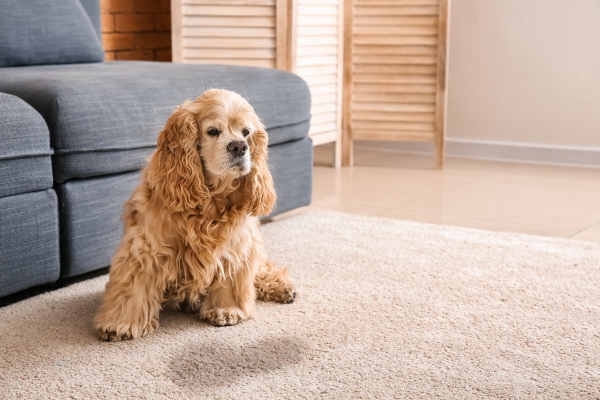
Especially if your dog is also urinating frequently, having urinary accidents, being a lethargic dog, or has bloody urine, you should make an appointment with your vet. Your dog may need antibiotics to combat the infection and keep his or her condition from worsening.
Strategies to reduce the frequency of UTIs
There also are some things you can do at home to help prevent future UTIs. They include:
- Ensure your dog always has access to fresh, clean drinking water.
- Allow your dog many opportunities to go outside to urinate so urine doesn’t sit in the bladder. Frequent urination can wash away bacteria that are traveling up the urethra. It also can flush out bacteria that made it to the bladder before they get a chance to set up an infection.
- Consider having your vet periodically screen your dog for a UTI if your dog has a condition such as Cushing’s disease in dogs, kidney failure in dogs, or others that make a dog more prone to UTIs.
Beware of pyometra
Before ending this section, I do want to mention that unspayed female dogs can get a potentially life-threatening uterine infection called a pyometra. This would be another non-anal gland reason that the back end of a female dog would smell like fish.
Sometimes the infected material is all trapped in the uterus. But other times, the dog will have a stinky vaginal discharge due to the infected material draining out of the body. A dog with a pyometra may urinate more frequently (just like a dog with a UTI), experience vomiting or diarrhea, run a fever, or be lethargic.
Pyometra is a medical emergency. If you are seeing these signs and think your dog could have a pyometra, get your dog to the vet right away for an emergency vet visit.
Fishy odor #4: Skin and ear yeast infections
Finally, sometimes it can be hard to localize where the fishy smell is coming from. This is especially true if it’s a large area like your dog’s skin or a place you might not think to sniff like the ears. If you are left wondering “Why does my dog smell like fish?” and it isn’t any of the other causes we talked about so far, it could be yeast overgrowth.
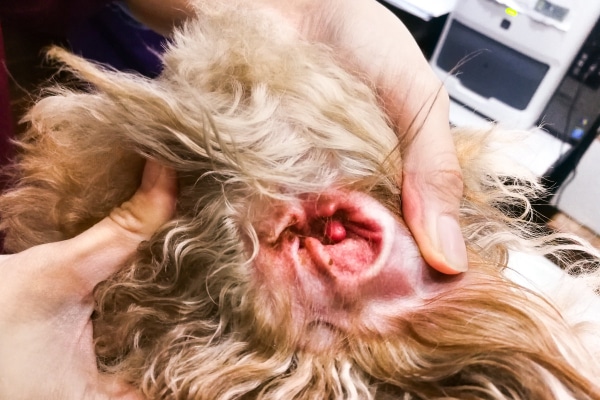
Any dog can suffer from skin conditions that result in a yeast infection. However, certain dog breeds are predisposed. Golden Retrievers, Labradors, Hounds, and Spaniels are all examples of dogs that are frequent fliers in the vet clinic for yeast infections.
Most commonly, these yeast infections will be in the ears. But in a wrinkly breed such as a Shar Pei or a Bulldog, those adorable folds of skin on the face, legs, and feet are a breeding ground for yeast too. Also, dogs with allergies may be prone to yeasty skin infections between their toes, or in their armpits and groin.
Once the vet diagnoses your dog with an ear infection (i.e. otitis in dogs) or a skin infection, he or she will help formulate a treatment plan. Generally, the vet will recommend anti-fungal ear drops or ointment for ear infections. Most of these dogs do not need oral medications.
In the past, medicated shampoo was one of the mainstays of treating yeast overgrowth on the skin. But for many dog parents, this proved to be difficult. The good news is that now we have topical mousses, sprays, and wipes that have made it much easier to treat yeasty dog skin.
How to prevent fishy-smelling yeast overgrowth
The other neat thing about these new topical products is that they can do a great job of preventing yeast overgrowths too. With dogs that are prone to smelly yeast infections, an ounce of prevention really is worth a pound of cure.
So, in addition to following the specific recommendations of your veterinarian, consider these skin and ear care tips to decrease how fishy your dog smells:
- Use a veterinary-approved ear cleaning solution weekly and ask your veterinarian to demonstrate how to clean your dog’s ears. Never use alcohol, hydrogen peroxide, or coconut oil in an ear.
- Clean and dry your dog’s ears after every bath and after swimming.
- Clean and dry skin folds or deep creases (tail pockets, armpits, between toes) on your dog every few days if he or she is prone to yeast infections. Cotton balls and cotton swabs are highly absorbent, which makes them perfectly suited for this job. Avoid using abrasive paper towels or washcloths to dry these areas.
- If you have a predisposed dog breed, start a skin and ear care routine in puppyhood rather than waiting for issues to arise.
- Ask your veterinarian about allergy medicine for dogs if your pup is experiencing more than one yeast infection per season despite good at-home cleaning and management.
- Consider a hypoallergenic diet or allergy testing if yeast infections are recurrent.
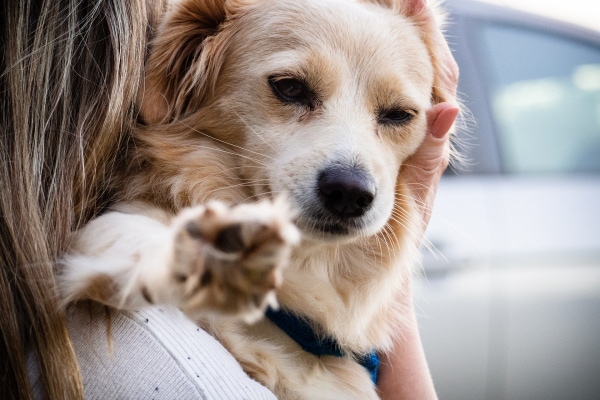
Talk to your vet
As you have discovered, there are many reasons why your dog may be smelly. Perhaps, like my dog, he or she just likes rolling in stinky things! Keep in mind though that a fishy odor could be related to one of the medical conditions we just finished talking about. This wasn’t an inclusive list, so it is also possible that your dog smells like fish for a different reason.
If you have any concerns about your dog’s health, please make an appointment with your veterinarian. He or she can help get your dog’s dental disease, UTI, anal gland issue, yeast overgrowth or other problems under control. In no time at all, your pup can be feeling—and smelling—a whole lot better.
What was the cause of your dog’s fishy smell?
Please comment below.


Hi there! My eight-year-old Belgian Mal had an anal gland infection. He probably had it for a few weeks before I brought him in. He was treated with an antibiotic (simplecef) for over three weeks. It’s tricky because he started and stopped at least two times because of yeast overgrowth. Vet said restart so we did. He still has blood in his anal sack. I do warm compresses and there is a lot of blood. And a lot of licking. He’s in pain. I’m not sure what to do at this point. Another antibiotic? Another drug? Is there anything else I can do?
Hi Cheryl,
I am so sorry your Mal is having these painful issues with his anal glands. Without examining him myself, it is hard to make specific recommendations. Sometimes when dealing with chronically infected glands, it requires surgery to have them removed. Also, I have flushed the glands with a diluted antibiotic in difficult cases. You may also want to talk to your vet about pursuing diagnostics to rule out the possibility of cancer being the underlying culprit. I am hopeful you can partner with your vet to find the best treatment for your sweet boy. Wishing you both the best for happier days ahead.
My 10 month french bulldog has a fishy odor and is licking herself
Hi Patricia,
I recommend you have your dog examined by your vet to find some answers.
My puppy Sadie,a boelboel mastiff of 5 months has already had a very bad uti.The vet had her on 2 different antibiotics and a anti-inflammatory to make her more comfortable. Since then she now smells like fish and has been licking herself alot.After reading your article I was wondering if it’s back? Could you please give me your opinion. Thank you .
Hi Jean,
You are right to be concerned about Sadie’s continued licking and the fishy smell. It is possible she has another UTI or that the original infection was never completely resolved, just minimized by the medications. These symptoms could also be signs of anal gland problems or many other issues. Your best bet is to have your vet recheck Sadie. I hope you can find the answers you need to get your young pup healthy and living her best life. Good luck!
I’m pretty sure that my dog Roxy has the anal gland one. Because every time her butt is facing me it smells like pure fish!
Hi Maya,
There may be hope for your stinky situation! Make sure your vet is aware of this potential anal gland issue. They can express the glands and let you know if they were enlarged or causing a problem. Sometimes adding a bit of extra fiber to a dog’s diet can clear up anal gland issues. An easy way to give extra fiber is with a small teaspoon of pumpkin added to your dog’s food. Talk to your vet and see if this would be recommended for your pup. It is always a good idea to ask before adding something to your pup’s diet to make sure it will not cause any unwanted side effects. Good luck!